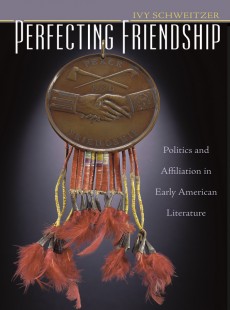
Perfecting Friendship
Politics and Affiliation in Early American Literature
Ivy Schweitzer
 Publisher: University of North Carolina Press
Publisher: University of North Carolina Press
Imprint: The University of North Carolina Press
Published: 09/2007
Pages: 288
Subject: Literary Criticism, History
| University of North Carolina
Print ISBN: 9.78E+12
eBook ISBN: 9780807876718
DESCRIPTION
Schweitzer begins with Aristotle's ideal of "perfect" friendship that positions freely chosen relationships among equals as the highest realization of ethical, social, and political bonds. Evidence in works by John Winthrop, Hannah Foster, James Fenimore Cooper, and Catharine Sedgwick confirms that this classical model shaped early American concepts of friendship and, thus, democracy. Schweitzer argues that recognizing the centrality of friendship as a cultural institution is critical to understanding the rationales for consolidating power among white males in the young nation. She also demonstrates how women, nonelite groups, and minorities have appropriated and redefined the discourse of perfect friendship, making equality its result rather than its requirement. By recovering the public nature of friendship, Schweitzer establishes discourse about affection and affiliation as a central component of American identity and democratic community.
RELATED TITLES






